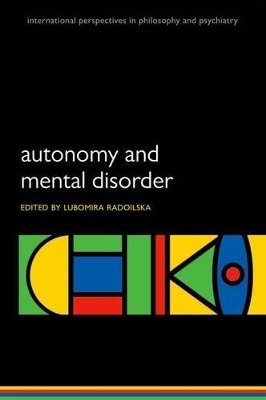
Autonomy and Mental Disorder
Seiten
2012
Oxford University Press (Verlag)
978-0-19-959542-6 (ISBN)
Oxford University Press (Verlag)
978-0-19-959542-6 (ISBN)
Autonomy is a fundamental though contested concept. This book is the first exploration into the nature and scope of personal autonomy in mental disorder, resulting in an important new contribution to the philosophy and psychiatry literature
Autonomy is a fundamental though contested concept. For instance, most of us place great value on the opportunity to make our own decisions and to be able to lead a life of our own choosing. Yet there is stark disagreement on what is involved in being able to decide autonomously, as well as how important this is compared with other commitments. For example, the success of every group project requires that group members make decisions about the project collectively rather than each on their own. This disagreement notwithstanding, mental disorder is routinely assumed to put a strain on autonomy. However, it is unclear whether this is effectively the case and, if so, whether this is due to the nature of mental disorder or of the social stigma that is often attached to it.
Autonomy and Mental Disorder is the first exploration of the nature and value of autonomy with reference to mental disorder. By reflecting on instances of mental disorder where autonomy is apparently compromised, it offers a systematic discussion of the underlying presuppositions of the present autonomy debates. In so doing, it helps address different kinds of emerging scepticism questioning either the appeal of autonomy as a concept or its relevance to specific areas of normative ethics, including psychiatric ethics.
Written by leading figures in philosophy and psychiatry, Autonomy and Mental Disorder will appeal to a wide range of readers in these and related disciplines.
Lubomira Radoilska is Affiliated Lecturer in the Faculty of Philosophy at Cambridge University and Research Associate of the Uehiro Centre for Practical Ethics at Oxford University. She is the author of Aristotle and the Moral Philosophy of Today (2007).
Autonomy is a fundamental though contested concept. For instance, most of us place great value on the opportunity to make our own decisions and to be able to lead a life of our own choosing. Yet there is stark disagreement on what is involved in being able to decide autonomously, as well as how important this is compared with other commitments. For example, the success of every group project requires that group members make decisions about the project collectively rather than each on their own. This disagreement notwithstanding, mental disorder is routinely assumed to put a strain on autonomy. However, it is unclear whether this is effectively the case and, if so, whether this is due to the nature of mental disorder or of the social stigma that is often attached to it.
Autonomy and Mental Disorder is the first exploration of the nature and value of autonomy with reference to mental disorder. By reflecting on instances of mental disorder where autonomy is apparently compromised, it offers a systematic discussion of the underlying presuppositions of the present autonomy debates. In so doing, it helps address different kinds of emerging scepticism questioning either the appeal of autonomy as a concept or its relevance to specific areas of normative ethics, including psychiatric ethics.
Written by leading figures in philosophy and psychiatry, Autonomy and Mental Disorder will appeal to a wide range of readers in these and related disciplines.
Lubomira Radoilska is Affiliated Lecturer in the Faculty of Philosophy at Cambridge University and Research Associate of the Uehiro Centre for Practical Ethics at Oxford University. She is the author of Aristotle and the Moral Philosophy of Today (2007).
Lubomira Radoilska is Affiliated Lecturer at the Cambridge Faculty of Philosophy and Research Associate of the Oxford Uehiro Centre for Practical Ethics. She is the author of 'Aristotle and the Moral Philosophy of Today' (2007). Her main research interests are in moral and political philosophy, ancient philosophy and the philosophy of mental disorder
PART I: MAPPING THE CONCEPTUAL LANDSCAPE; PART II: AUTONOMY IN LIGHT OF MENTAL DISORDER; PART III: RETHINKING CAPACITY AND RESPECT FOR AUTONOMY; PART IV: EMERGING ALTERNATIVES
| Reihe/Serie | International Perspectives in Philosophy & Psychiatry |
|---|---|
| Verlagsort | Oxford |
| Sprache | englisch |
| Maße | 155 x 234 mm |
| Gewicht | 506 g |
| Themenwelt | Geisteswissenschaften ► Philosophie ► Ethik |
| Geisteswissenschaften ► Psychologie ► Persönlichkeitsstörungen | |
| Medizin / Pharmazie ► Medizinische Fachgebiete ► Psychiatrie / Psychotherapie | |
| Studium ► Querschnittsbereiche ► Geschichte / Ethik der Medizin | |
| Recht / Steuern ► EU / Internationales Recht | |
| ISBN-10 | 0-19-959542-9 / 0199595429 |
| ISBN-13 | 978-0-19-959542-6 / 9780199595426 |
| Zustand | Neuware |
| Haben Sie eine Frage zum Produkt? |
Mehr entdecken
aus dem Bereich
aus dem Bereich
Die Geschichte eines Weltzentrums der Medizin von 1710 bis zur …
Buch | Softcover (2021)
Lehmanns Media (Verlag)
17,95 €
von der Antike bis zur Gegenwart
Buch | Softcover (2024)
C.H.Beck (Verlag)
12,00 €
Krankheitslehren, Irrwege, Behandlungsformen
Buch | Softcover (2024)
C.H.Beck (Verlag)
39,95 €


